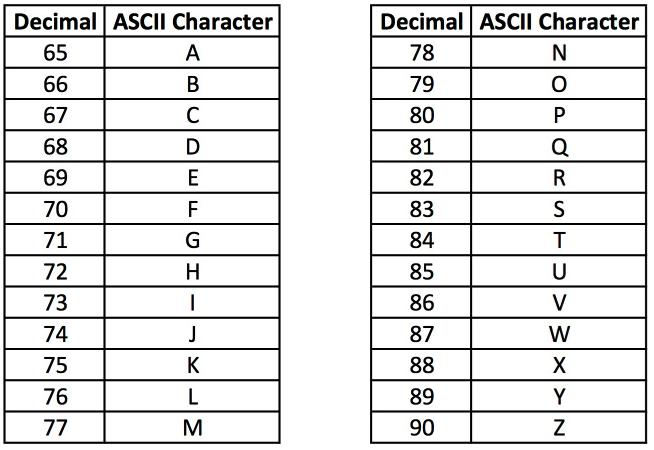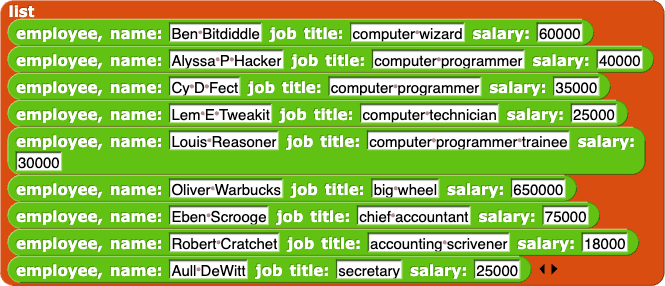Nesting Function Calls

Here are 3 powerful higher-order functions (functions that take other functions as input):
-
Map performs a function on each item in a list and outputs a list, which you first saw in Using Lists to Write Vowel?.
)over(list-elephant-lion-eel-mouse-anteater).png)
-
Keep chooses specific items and outputs a list, which you first saw in Developing a Block That Makes Plurals.
-equals-h)-from-test-list.png)
-
Combine calls a combining function (a function with two inputs) across all items in the set and outputs an object that may be a number, string, or list, depending on the combiner, which you may have seen in Script Variable Projects.

The three can be used together to build more advanced functions.
Character Encoding
Every character you type is encoded by the computer as a number. Unicode assigns a number to every letter that can be typed in any language, as well as to special characters, such as !, @, #, ö, λ, ♣, and the space bar.
ASCII is a small subset of Unicode that includes letters, numbers, and a few symbols. The list of
Unicode characters is much longer.

- Use the green block
 to figure out the unicode for "A", "Z", "a", and "z".
to figure out the unicode for "A", "Z", "a", and "z".
- Use the green block
 to figure out the letter for the unicode numbers 72, 105, 33.
to figure out the letter for the unicode numbers 72, 105, 33.
- Use those blocks, along with the higher order functions from the previous lab, to decode this message:

-
You may have built a unicode encode block in
Unit 2 Lab 2: Script Variable Projects. If so, compare the technique you used then with the technique you used now with lists. How do they differ?
encode (message) that takes an input message (a sentence), tears it into letter-sized chunks, gets the unicode, adds 1 to each letter, and reports the encoded message.
- Build a
decode (message) block to reverse encode (message).

You could use mod to make the letters of the alphabet loop around to the beginning. You will need to take into account that A is 65.
- Build an
encode (message) by (offset) block that takes an input message and an offset value, gets the unicode of the message, adds the offset to each letter, and outputs the encoded message.
- Build a
decode (message) by (offset) block that takes an input message and an offset value and reverse encode (message) by (offset).
Acronym Generator
An acronym is a "word" made up of the first letters of every capitalized word in a phrase. For example, the acronym for United States of America is USA, and SUNY is an acronym for State University of New York.
In this project, you will create a reporter block that takes a phrase as input and reports an acronym made only from the capitalized words. It should work like this:


-
Create a reporter that takes a phrase as input and reports an acronym made of the first letters of the capitalized words. The steps below suggest one way:

- The input phrase is a string of characters. Break it up into a list of words.
There are many ways to turn a string like "Beauty and Joy of Computing" into a list of words. One way is to use this green block:

(pronounced "sentence to list"). It lets you break a string at every space and convert the string to a list of words. It's in the Tools library.
The unicode of block will be helpful here.
- You have choices about the next step. You could use
map to generate a new list containing only the first letters of the words in your input list, and then keep only those that are capital letters. OR, you could keep only the words that begin with capitals and then use map to create a list containing only the first letters of those words.
 Last, you need to convert that list back into a string.
Last, you need to convert that list back into a string.
-
Click the picture to load this database project:

This is the list of employees of a small company. (Taken from Structure and Interpretation of Computer Programs by Abelson and Sussman. Creative Commons licensed.) Each of the smaller lists contains a person's name, job title, and yearly salary.
"This company spends more money on the big bosses than on the people who do the work," says Alyssa one day. Is she right? Write an expression to compute the total salaries of everyone paid less than $100,000 per year. Then find the total for everyone paid more than $100,000 per year.
- Ben suggests that the results will be more convincing in the form of a list containing that total and all the names of the people in that category (paid less than $100,000, for example). So, if there are five people in that category, your list will have six items: first the total of the salaries, and then the names of the people. Try this both for less than $100,000 and for more than $100,000.
- Find the average salary of people paid less than $100,000 per year.
)over(list-elephant-lion-eel-mouse-anteater).png)
-equals-h)-from-test-list.png)


 to figure out the unicode for "A", "Z", "a", and "z".
to figure out the unicode for "A", "Z", "a", and "z".  to figure out the letter for the unicode numbers 72, 105, 33.
to figure out the letter for the unicode numbers 72, 105, 33. 


 (pronounced "sentence to list"). It lets you break a string at every space and convert the string to a list of words. It's in the Tools library.
(pronounced "sentence to list"). It lets you break a string at every space and convert the string to a list of words. It's in the Tools library.